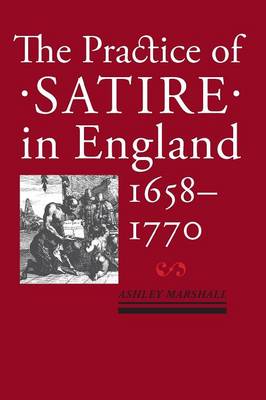
Stock image for illustration purposes only - book cover, edition or condition may vary.
The Practice of Satire in England, 1658-1770
Ashley Marshall
€ 56.82
FREE Delivery in Ireland
Description for The Practice of Satire in England, 1658-1770
Paperback. Rather, it is a collection of episodic little histories. Num Pages: 456 pages. BIC Classification: 2AB; DSBD; DSK. Category: (P) Professional & Vocational. Dimension: 235 x 155 x 29. .
Outstanding Academic Title, Choice In The Practice of Satire in England, 1658-1770, Ashley Marshall explores how satire was conceived and understood by writers and readers of the period. Her account is based on a reading of some 3,000 works, ranging from one-page squibs to novels. The objective is not to recuperate particular minor works but to recover the satiric milieu-to resituate the masterpieces amid the hundreds of other works alongside which they were originally written and read. The long eighteenth century is generally hailed as the great age of satire, and as such, it has received much critical attention. However, scholars have focused almost exclusively on a small number of canonical works, such as Gulliver's Travels and The Dunciad, and have not looked for continuity over time. Marshall revises the standard account of eighteenth-century satire, revealing it to be messy, confused, and discontinuous, exhibiting radical and rapid changes over time. The true history of satire in its great age is not a history at all. Rather, it is a collection of episodic little histories.
Product Details
Publisher
Johns Hopkins University Press
Format
Paperback
Publication date
2016
Condition
New
Weight
669g
Number of Pages
456
Place of Publication
Baltimore, MD, United States
ISBN
9781421419855
SKU
V9781421419855
Shipping Time
Usually ships in 7 to 11 working days
Ref
99-1
About Ashley Marshall
Ashley Marshall is an associate professor of English at the University of Nevada, Reno. She is the author of Swift and History: Politics and the English Past
Reviews for The Practice of Satire in England, 1658-1770
Impressively comprehensive and provocative... This strong and wide-ranging book... earns its authority from the wealth of information it provides... Its determination to expand the range of satirical writing, somewhat in the spirit of Eliot's admonition, is a long-needed redefinition of the scope of the subject... It also offers a considerable enlargement of our knowledge and understanding of a lively and turbulent terrain, whose boundaries are wider and more untidy than we have imagined.
Times Literary Supplement
Marshall... revolutionizes the study of 18th-century satire. She not only significantly revises accepted definitions of satire but also analyzes and describes vastly greater numbers of satiric works than have previous studies... This original, detailed account of satire during the period will challenge and shape the literary history of satire for decades to come. Essential.
Choice
So much material is included in The Practice of Satire in England, and its historiographic claims are so striking, that scholars will be discussing this book for some time. Perhaps most admirably, Marshall has put satire, recently a rather neglected genre, firmly back at the center of scholarly attention and debate.
Nicholas Hudson
Philological Quarterly
The Practice of Satire in England, 1658-1770 is a tremendously ambitious book... at once, monumental and humble-conscious of its own audacity, unfailingly respectful of the scholars whose work is being called into question, yet also confident of its contribution to the advancement of humanistic learning.
Matthew J. Kinservik
Modern Philology
Broadening the notion of satire to include more works, more kinds of works, and a wider range of satirical motives and effects, [Marshall] offers an account of eighteenth-century literature more amenable to contemporary sensibilities than those of previous proponents and detractors of satire.
Eighteenth-Century Life
Times Literary Supplement
Marshall... revolutionizes the study of 18th-century satire. She not only significantly revises accepted definitions of satire but also analyzes and describes vastly greater numbers of satiric works than have previous studies... This original, detailed account of satire during the period will challenge and shape the literary history of satire for decades to come. Essential.
Choice
So much material is included in The Practice of Satire in England, and its historiographic claims are so striking, that scholars will be discussing this book for some time. Perhaps most admirably, Marshall has put satire, recently a rather neglected genre, firmly back at the center of scholarly attention and debate.
Nicholas Hudson
Philological Quarterly
The Practice of Satire in England, 1658-1770 is a tremendously ambitious book... at once, monumental and humble-conscious of its own audacity, unfailingly respectful of the scholars whose work is being called into question, yet also confident of its contribution to the advancement of humanistic learning.
Matthew J. Kinservik
Modern Philology
Broadening the notion of satire to include more works, more kinds of works, and a wider range of satirical motives and effects, [Marshall] offers an account of eighteenth-century literature more amenable to contemporary sensibilities than those of previous proponents and detractors of satire.
Eighteenth-Century Life
